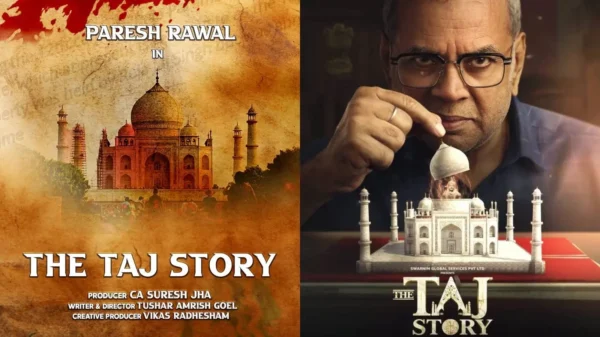The Taj Story (2025) – Movie Synopsis
Introduction
The Taj Story is a 2025 Indian courtroom drama directed by Tushar Amrish Goel and starring Paresh Rawal, Amruta Khanvilkar, Zakir Hussain, and Namit Das. The film offers a gripping narrative centered on one of India’s most iconic monuments — the Taj Mahal — and the questions surrounding its history and identity. Blending fiction with socio-political commentary, The Taj Story aims to challenge audiences to think beyond what they’ve been taught.
Synopsis
Set in contemporary India, the film follows Vishnu Das (Paresh Rawal), a humble tour guide in Agra who has spent years narrating the conventional tale of the Taj Mahal — the symbol of eternal love built by Emperor Shah Jahan for Mumtaz Mahal. However, Vishnu’s curiosity about the monument’s origins is sparked when he comes across inconsistencies in historical records and local folklore.
As he delves deeper, Vishnu’s search for the truth transforms into a national controversy. His findings provoke outrage among scholars, politicians, and religious groups, leading to a heated courtroom battle where he must defend his claims. The case quickly becomes a reflection of India’s struggle with its own heritage — balancing faith, history, and identity.
Throughout the trial, Vishnu faces opposition from powerful forces determined to maintain the established narrative. Yet, he remains steadfast, arguing that history belongs to all and must be open to scrutiny. The courtroom becomes a battleground of ideologies, where evidence, belief, and emotion collide.
Characters
-
Vishnu Das (Paresh Rawal) – A seasoned tour guide whose pursuit of truth turns him into a reluctant hero.
-
Adv. Meera (Amruta Khanvilkar) – A passionate lawyer representing Vishnu, embodying courage and reason amidst chaos.
-
Raghav Sharma (Namit Das) – The prosecutor who defends the official version of history.
-
Justice S. Mathur (Zakir Hussain) – The judge presiding over the case, torn between law and public sentiment.
Themes
The Taj Story explores themes of truth vs. belief, freedom of inquiry, and the politics of history. It raises important questions: Who decides what history becomes official? Can facts survive when intertwined with faith and power? The film uses the Taj Mahal as a powerful metaphor — a monument admired worldwide yet clouded by differing interpretations of its past.
Tone and Style
The narrative balances intense courtroom exchanges with quiet, reflective moments, highlighting Vishnu’s emotional turmoil. Cinematically, the film contrasts the majestic beauty of the Taj Mahal with the claustrophobic tension of the courtroom, symbolizing the gap between glory and reality.
Conclusion
In its essence, The Taj Story is more than just a historical drama — it is a story about courage, questioning, and the pursuit of truth in a world that often fears it. Through its layered storytelling and compelling performances, the film challenges audiences to look at history not as a set of fixed facts but as a living dialogue between past and present.
